Small Business Focus: A taxing tale for small business
Published 12:00 am Friday, April 26, 2002
By JACK FARIS
It wasn’t the lead story on the evening news, and it didn’t make page one in most newspapers, but an April 12 announcement by the Internal Revenue Service brought relief to more than a half million small-business owners across the country. The IRS issued final rules allowing many more small businesses to use the cash accountig method for computing taxes.
Talking about whether to use the cash method or the accrual method is not the stuff of cocktail party conversation, and even members of Congress admit their eyes glaze over when the subject comes up. But to small-business owners, it’s a big deal.
Under the accrual method, most small-business owners need help from a tax consultant or accountant to keep track of inventories and accounts receivable and determine what they owe the IRS. That’s money out of their pockets. The accrual method requires a business owner to pay taxes on money he hasn’t even received. Cash flow is a major concern of most small-business owners and paying the IRS before getting money from customers often leaves a business owner short of cash.
It’s a simple matter of fairness: A contractor who spends a year building inventory for work she’s anticipating ends up paying taxes on the value of the inventory, regardless of whether it’s been used or not. A paint business ran afoul of the IRS when, after previous audits had accepted the cash method of accounting, a subsequent audit ruled the firm should have been using the accrual method. The reason: material costs exceeded 15 percent of revenue. The result: a $200,000 tax bill.
NFIB and others have been working for at least 20 years to change the rules. Many, including members of Congress and tax lobbyists thought The Tax Simplification Act of 1986 fixed the problem. But the IRS, citing the “legislative history” of the Act, didn’t agree.
But it’s the dawn of a new day in Washington. In the past year, the Bush Administration and the leaders at the Treasury Department and the IRS took a genuine interest in the problem. So did U.S. Sen. Kit Bond (Mo.) and other members of Congress. With their help the new rule was issued and will be effective immediately.
That rule states that qualifying businesses with less than $10 million in annual revenues can use cash accounting for tax purposes. The rule change will benefit more than 500,000 small businesses by reducing administrative costs, allowing deduction of supplies when purchased and eliminating taxeson income never received.
This is but one example of the vagaries and complexities of the IRS Code. The accounting issue has been resolved, but House and Senate committees have held hours of hearings and countless meetings have been held over the years between small-business groups and the IRS. Unwitting small-business owners have paid thousands, perhaps millions, of dollars in fines and interest charges. There is much more that needs fixing.
That is why small-business owners believe the entire Code must be rewritten and simplified and why last year’s tax relief must be made permanent, rather than repealing it in 2011, as currently planned.
JACK FARIS is president of NFIB (the National Federation of Independent Business), the nation’s largest small-business advocacy group.





